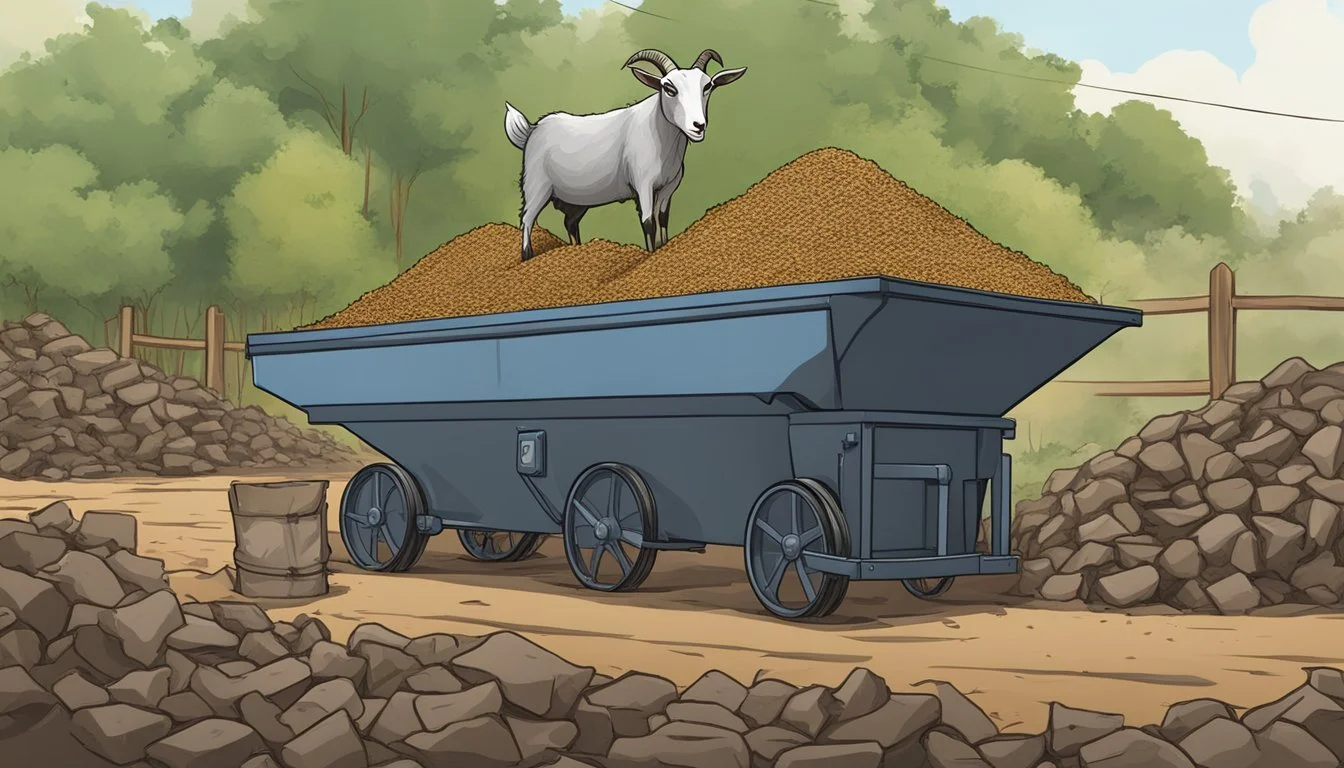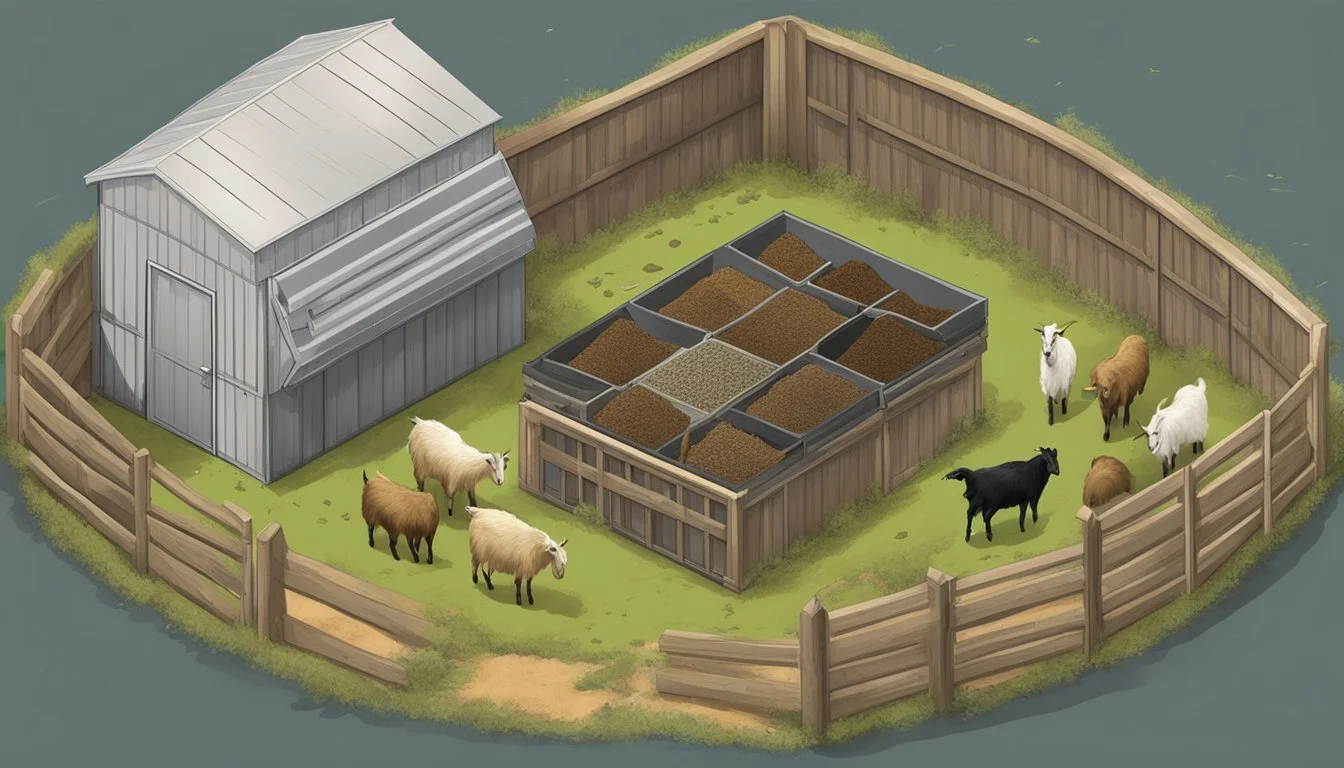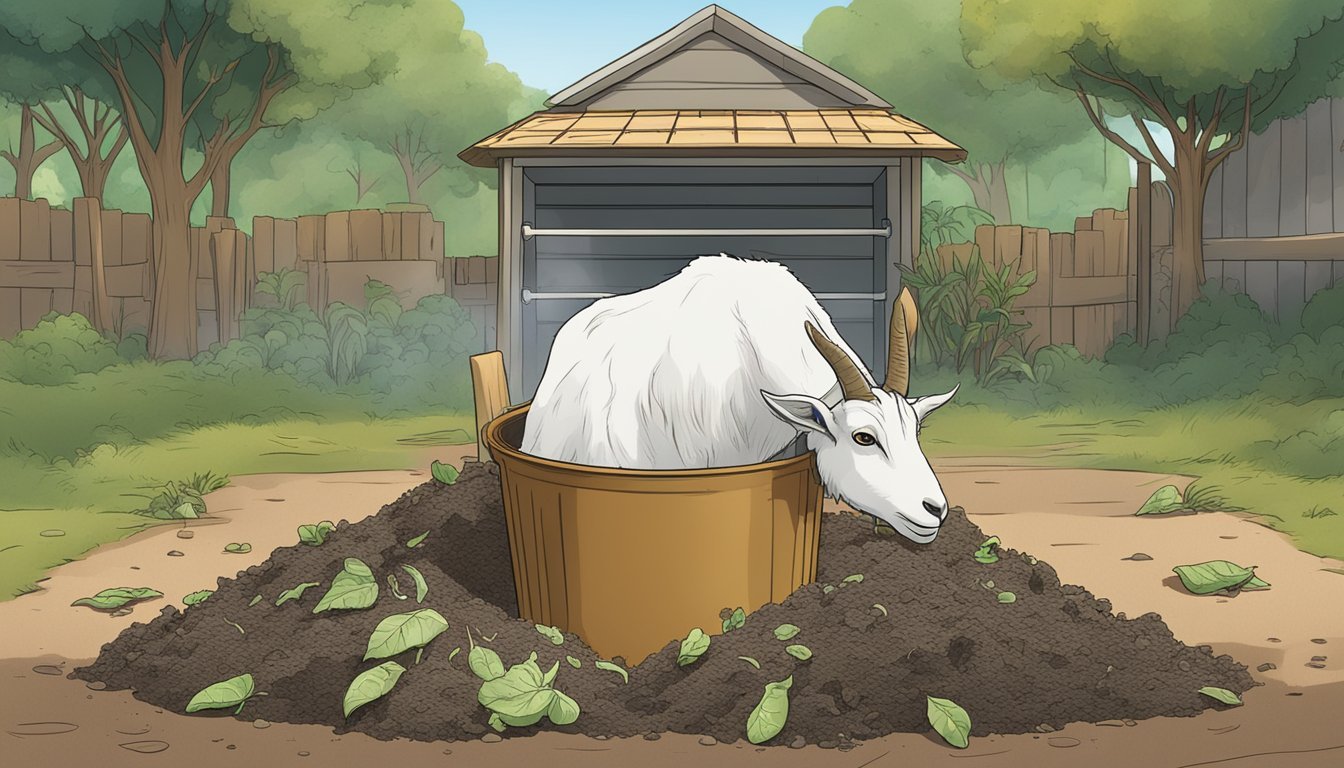Can I Compost Goat Manure and How to Do It Effectively
Composting goat manure is a highly effective way to recycle waste into a nutrient-rich fertilizer that can significantly benefit garden soils. Contrary to synthetic fertilizers, composted goat manure enriches the soil without introducing harmful chemicals, thereby promoting healthier plant growth and increased crop yields. The organic matter within goat manure helps improve soil structure, water retention, and aeration, providing plants with a more hospitable growing environment.
The process of composting goat manure is straightforward and environmentally friendly. It involves natural decomposition of organic materials, which, when managed properly, breaks down into a safe and efficient organic fertilizer. Given the right balance of carbon-rich materials, moisture, and regular aeration through turning, goat manure compost can be ready for use in as little as a few months, depending largely on the conditions and techniques applied.
Many gardeners appreciate that composting goat manure not only creates a valuable garden resource but also reduces waste. Understanding and implementing this method of composting can yield considerable rewards for gardeners looking to harness the benefits of organic waste while nurturing their garden ecosystems.
Benefits of Goat Manure as Compost
Goat manure offers a wealth of advantages for gardeners and farmers seeking to enrich soil naturally and sustainably. Its unique properties make it an outstanding choice for organics recycling through composting.
Nutrient Composition
Goat manure is nutrient-rich, containing vital elements necessary for plant growth such as nitrogen, phosphorus, and potassium. When composted, the manure provides a balanced nutrient release, offering a well-rounded fertilizing effect that can lead to more robust plants and better yields.
Nitrogen: Crucial for leaf and stem growth.
Phosphorus: Supports root development and flowering.
Potassium: Enhances overall plant health.
Soil Enhancement
Composting goat manure adds substantial organic matter to the soil, which improves its structure and increases soil fertility. The addition of organic materials improves water retention, aids in microbial activity, and can result in healthier, more productive soil.
Organic Matter: Increases water retention and soil aeration.
Soil Fertility: Perfect for gardens, boosting the ability to sustain plant life.
Eco-Friendly Option
By utilizing goat manure as compost, gardeners and farmers embrace an eco-friendly approach to fertilization. This practice supports the environment by recycling waste into valuable compost, minimizing reliance on chemical fertilizers, and contributing to the sustainability of organic farming practices.
Environment: Reduces waste and chemical inputs.
Eco-friendly: Encourages a sustainable, natural cycle of nutrients in the ecosystem.
Composting Basics
Composting is a methodical process of turning organic material into nutrient-rich soil conditioner through natural decomposition. One can compost goat manure successfully by understanding and managing the key elements of composting: the ratio of carbon to nitrogen, moisture, aeration, and temperature, which are crucial for encouraging the growth of microorganisms that break down waste.
Composting Process
Composting involves mixing organic materials like goat manure with carbon-rich materials, such as leaves and straw. These ingredients are then left to decompose, with occasional turning to help maintain oxygen levels. Microorganisms play a vital role by breaking down these materials into humus, a stable end product that enhances soil health.
Ratio of Carbon to Nitrogen
A balanced ratio of carbon to nitrogen (C ratio) is pivotal for effective composting. The ideal C ratio is typically around 25-30:1, with carbon acting as an energy source for microorganisms and nitrogen as a protein source to build their cell structure. Goat manure, being richer in nitrogen, should be balanced with carbon sources like sawdust or dry leaves to promote optimal decomposition.
Importance of Moisture and Aeration
For microorganisms to thrive, the compost pile requires proper moisture and aeration. The material should be as wet as a wrung-out sponge, with moisture levels around 40-60%. Regular turning introduces oxygen, preventing materials from compacting, thus aiding in maintaining the necessary aerobic condition for the microorganisms.
Regulating Temperature
As microorganisms break down the organic material, they generate heat, increasing the temperature of the compost pile. This heat is crucial for killing pathogens and weed seeds. The pile should maintain a temperature between 130°F to 160°F (55°C-70°C). Monitoring with a compost thermometer is recommended to ensure the pile does not overheat or cool too quickly.
Preparing Goat Manure for Composting
Composting goat manure involves a few essential steps: proper collection and storage, treatment before composting, and the right sizing and layering of materials. By following these procedures, one can ensure an effective composting process to transform goat manure into a valuable organic fertilizer.
Collection and Storage
Collecting goat manure should be done regularly to prevent the buildup of odors and to maintain cleanliness in the goat's living area. It is recommended to use tools such as shovels or scoop rakes for collection. Storage conditions matter greatly; the collected manure should be stored in a covered yet ventilated area to facilitate a pre-composting breakdown and to prevent it from being overly wet or dry, which could hinder the composting process.
Pre-Composting Treatment
Preparation of goat manure before it enters the composting stage is crucial. This involves checking the moisture content, which should be between 40% and 60% to create the best composting conditions. Pre-composting treatment often includes the addition of carbon-rich materials such as straw or sawdust to balance nitrogen levels and to absorb excess moisture, facilitating aeration and microbial activity within the manure.
Sizing and Layering
The size of the goat droppings and the auxiliary materials should be appropriate to expedite decomposition. Smaller particles decompose more quickly but require proper aeration to avoid anaerobic conditions. When layering, aim to alternate layers of goat manure with layers of bulking agents like straw or sawdust. This creates a balanced compost pile that allows air to circulate around the materials, providing oxygen that is essential for the composting process.
Building and Maintaining Your Compost Pile
Successful composting of goat manure requires careful construction and regular maintenance of the compost pile. By managing aeration, moisture content, and heat within the pile, one can ensure efficient decomposition.
Creating the Pile
One begins by selecting an appropriate location for the compost bin or designated composting area, ideally well-drained and partially shaded. To build the pile, layers of goat manure should be alternated with carbon-rich materials, such as straw or leaves, to maintain a balanced carbon-to-nitrogen ratio. The initial layering shapes the foundation for the compost pile, which should be moistened as it's constructed to kickstart the microbial activity.
Turning the Pile
Regular turning of the pile is essential to introduce oxygen and redistribute heat throughout the composting materials. Turning should occur every few days, especially when the pile's core temperature reaches between 130°F and 160°F. This helps to maintain an optimal decomposition environment and prevents the creation of odor-causing anaerobic zones.
Week 1: Turn twice
Week 2-4: Turn weekly
Month 2 onwards: Turn bi-weekly or as needed to maintain aeration and even decomposition
Monitoring the Compost Pile
Constant monitoring ensures the compost pile is in an ideal state for decomposition. The moisture content should resemble a wrung-out sponge, while the temperature gauge serves as an indicator of microbial activity: too cool indicates a need for more aeration or nitrogen, while excessive heat necessitates more frequent turning and possibly additional carbon. Oxygen concentration is crucial; thus, regular turning assures proper aeration and promotes a thriving microbial environment.
Using Goat Manure Compost in the Garden
Goat manure compost serves as both a fertilizer and soil amendment, bringing benefits directly to gardens. Its use promotes the growth of a broad range of plants by improving soil structure and providing essential nutrients.
Application Techniques
Direct Incorporation: For best results, mix goat manure compost into the top layers of garden beds before the planting season begins. Aim to incorporate about 2 to 4 inches of compost, thoroughly blending it with the existing soil.
As Mulch: Apply a 2 to 3-inch layer of goat manure compost around the base of plants to act as a mulch. This will not only suppress weeds but also help retain soil moisture and slowly release nutrients.
Top Dressing: For established plants, top dressing with goat manure compost can provide a nutritional boost. Simply spread a thin layer around the plants, carefully avoiding direct contact with the stems.
Types of Plants That Benefit
Herbs and Vegetables: Many herbs and vegetables thrive with the application of goat manure compost. It enriches their growth environment with an ideal balance of nitrogen, phosphorus, and potassium.
Fruit Trees: Applying goat manure compost around fruit trees can lead to more vigorous growth and better yields, by significantly enriching the soil.
Flowering Plants: Both perennial and annual flowering plants can show more vivid blooms and improved vitality when goat manure compost is applied, enhancing overall garden aesthetics.
Safety and Health Considerations
When composting goat manure, it is critical to address potential health risks, such as the presence of pathogens and parasites, as well as issues related to odors and insects. Proper management of these risks ensures a safe and effective composting process.
Pathogens and Parasites
Goat dung can harbor various pathogens and parasites that present risks to humans and plants. These can include Escherichia coli (E. coli), Salmonella, and parasitic worms. Therefore, achieving high temperatures during composting is essential to effectively kill these harmful organisms. A consistent temperature between 130°F to 160°F (55°C-70°C), sustained for at least several days, is recommended for sanitizing the compost.
Temperature Monitoring: Utilize a compost thermometer to maintain ideal temperatures.
Duration: Ensure the pile reaches the target temperature range for a sufficient period.
Odor Control and Insect Management
The presence of foul odors can indicate improper composting processes, while also attracting unwanted flies and other pests. To manage odors and insects:
Aeration: Regularly turn the compost pile to introduce oxygen, which helps reduce odors and accelerates the breakdown of organic materials.
Covering: Cover the pile with a layer of straw or finished compost to minimize odor escape and deter flies.
Managing odors and insect attraction is not only a matter of comfort but also a health consideration, as flies can be vectors for disease.
Implementing these practices helps mitigate health risks, ensuring the safe application of composted goat manure to garden soil.
Compost Teas and Liquid Fertilizers
Creating liquid fertilizers such as goat manure tea is an efficient way to deliver nutrients directly to plants. With properly composted goat manure, gardeners can concoct a tea rich in nutrients, which provides a quick boost of nourishment in a form that is readily available to plants.
Making Goat Manure Tea
To prepare goat manure tea, one must steep fully composted goat manure in water. The process involves a few critical steps to ensure the tea is both nutrient-rich and safe for garden use. First, select fully composted goat manure that has had ample time to mature, which typically ranges from three to six months under ideal composting conditions.
Ingredients & Supplies:
Fully composted goat manure
Non-chlorinated water
Large bucket or barrel
Cheesecloth or a fine mesh bag
Stirring tool
Steps:
Fill a large bucket or barrel with non-chlorinated water.
Encase a portion of composted goat manure within the cheesecloth or place it directly into the water for a stronger brew.
Allow the mixture to steep for a period, often ranging from 24 to 48 hours; this ensures optimal extraction of nutrients.
Stir the mixture occasionally to increase aeration and facilitate the release of nutrients into the water.
Once brewing is complete, remove the solids by straining the mixture through the cheesecloth or mesh bag.
Dilute the resulting goat manure tea with more water if it appears too strong, which can be determined by its color—a light brown hue similar to weak tea is generally desired.
The finished goat manure tea should be applied to the soil around plants or used as a foliar spray. The tea provides a multitude of nutrients, including nitrogen, phosphorus, and potassium, along with trace elements essential for plant growth. The use of this liquid fertilizer not only enhances plant health but also improves soil moisture retention. It's important to note that while goat manure tea can deliver nutrients fast, it should complement, not replace, a comprehensive soil fertility plan.
Advanced Tips for Experienced Composters
Experienced composters understand that the key to successful composting is the delicate balance of ingredients that contribute to soil health and fertility. By optimizing the composting process of goat manure, one can significantly improve soil texture and enhance nutrient availability, leading to robust microbial activity and better crop yields.
Improving Soil Texture and Fertility
Goat manure is particularly effective at improving soil texture due to its ability to break down easily and enhance soil structure. For a well-aerated compost pile that optimizes microbial activity, experienced composters aim for:
A mixture of brown (carbon-rich) and green (nitrogen-rich) materials in a 25-30:1 carbon-to-nitrogen ratio.
Adding bulking agents like straw or sawdust to prevent compaction, which maintains the necessary porosity of the compost pile for optimal airflow and moisture retention.
To further improve soil fertility, it is essential to:
Regularly turn the compost pile to evenly distribute microorganisms and facilitate the breakdown of organic materials.
Maintain moisture levels akin to a wrung-out sponge to sustain microbial activity without creating an anaerobic environment.
Experienced composters may also incorporate rock dust or biochar, as these can enhance mineral content and aid in long-term soil fertility.
Enhancing Nutrient Availability
The composition of goat manure already contains valuable nutrients like nitrogen, phosphorus, and potassium. However, experienced composters can enhance the nutrient availability to plants by:
Monitoring the temperature of the compost pile, aiming to keep it between 130°F to 160°F, which helps in destroying pathogens while preserving beneficial microbes.
Implementing a composting thermometer to accurately gauge the pile's internal temperatures, ensuring that it remains within the optimal range.
Additionally, one can:
Use finished compost as a top dressing around plants to slowly release nutrients into the soil profile.
Apply compost in conjunction with crop rotations and cover cropping strategies to maintain soil health and nutrient balance.
Through these methods, composters can transform goat manure into a rich, organic fertilizer that is not only safe and efficient but also improves the overall productivity of the garden or farm.
Finding Goat Manure and Composting Supplies
Acquiring quality goat manure for composting can greatly enrich a garden's soil. For gardeners looking to start composting with this valuable resource, finding goat manure and the necessary supplies is the first step.
Local Sources and Retailers
Local Farms: Often the best source for fresh goat manure are local farms with goats. They typically offer manure in varying quantities, which can be perfect for gardens of any size. It's important to inquire about the diet and health of their goats, as this can affect the quality of the manure.
Garden Supply Centers: For composting supplies such as bins, tools, and thermometers, garden supply centers are a reliable choice. They offer a wide range of products tailored for composting needs, including items specifically meant for managing manure-based compost.
Retailers: Several retailers, both online and brick-and-mortar, provide bagged goat manure and composting supplies. This can be a more convenient option if transportation of large amounts of manure is an issue, or if there are no local farms available.
When sourcing manure and supplies, it's crucial to ensure the materials are of high quality and the tools are durable. Researching suppliers, reading reviews, and comparing prices will help one make an informed decision.
Alternative Uses for Goat Manure
While often composted, goat manure can also provide direct benefits to your garden and homestead with careful management and application practices in its uncomposted form.
Direct Applications in the Garden
Goat manure, with its rich nutrient profile, can act as a powerful organic fertilizer when applied directly to garden soil. Gardeners favor goat manure for its balanced components, which include nitrogen, phosphorus, and potassium. To apply, spread a thin layer of dried, aged manure onto the soil, avoiding direct contact with plant stems and roots to prevent burn. This can help enhance soil health and fertility, fostering robust plant growth.
Homesteaders and Livestock Owners
For homesteaders and livestock owners, goat manure can be more than just waste; it's a resource. By strategically cycling the manure back within their property, they can improve the nutrient density of their pastures. Applying it directly to the fields where livestock graze can promote better grass quality and, in turn, support the overall well-being of the animals. These direct applications can reduce reliance on commercial fertilizers, making the homestead more sustainable.
Environmental Impact and Sustainability
Composting goat manure contributes significantly to environmental health and sustainability. By turning goat waste into compost, one effectively recycles organic matter, reducing landfill use and minimizing chemical fertilizer dependency.
Reducing Dependence on Chemical Fertilizers
Organic agriculture greatly benefits from composted goat manure as it provides a sustainable, eco-friendly alternative to chemical fertilizers. This recycling of organic matter not only enriches the soil naturally but also fosters a balanced ecosystem. Utilizing this nutrient-rich compost supports plant growth and reinforces the health of the environment, eliminating the need for potentially harmful synthetic inputs. By integrating composted goat manure into their practices, farmers can sustain soil fertility and contribute to a greener agriculture paradigm.






